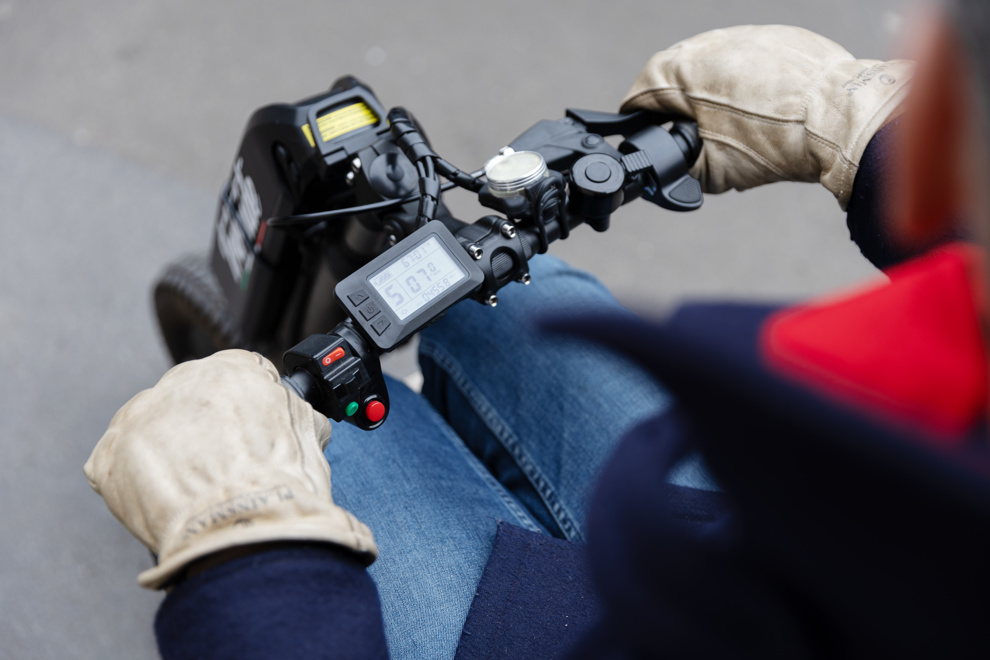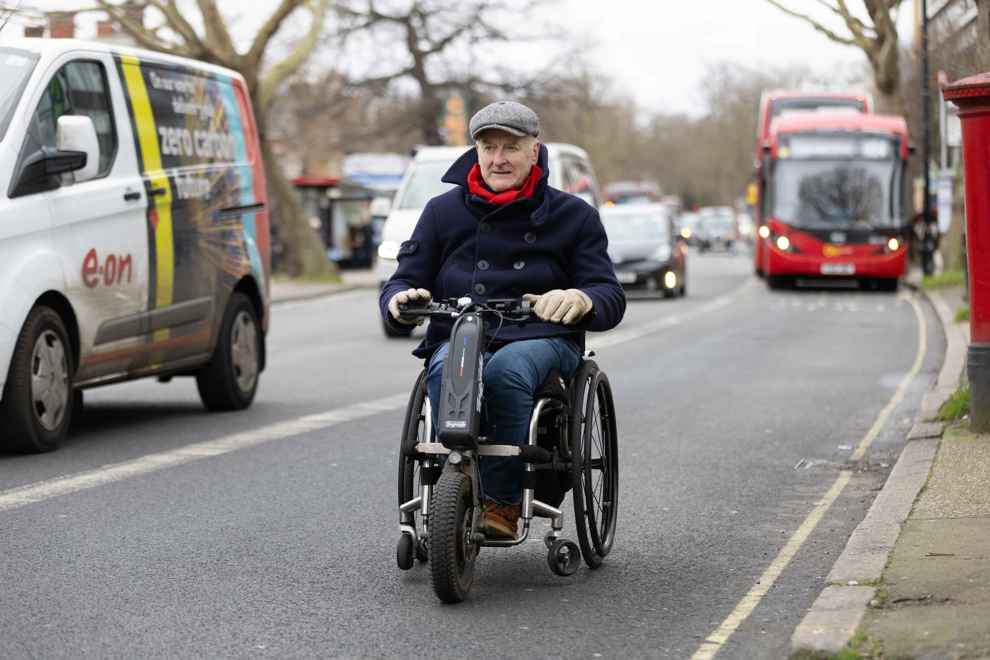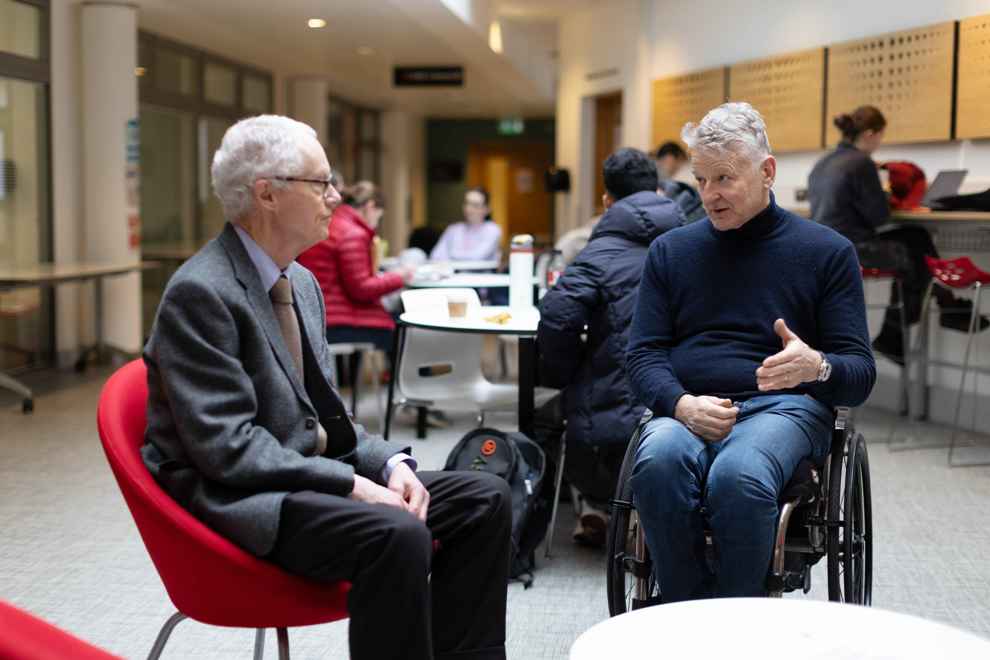Jonathan Bell is deep into a compelling War and Psychiatry Master’s degree that will help him use his life experiences to support veterans and ensure their voices are heard. The course, which delves into complex strands of behavior, policy, and history, is demanding and intense. However, Jonathan has made it easier by completing one important assignment—a successful application to the Veterans’ Mobility Fund for a lightweight wheelchair with an assisted power pack.

The former 1st Battalion Green Howard is now able to commute much more easily from his home in Surrey to central London, whizzing along cycle lanes to lectures, seminars, and library sessions at King’s College Institute of Psychiatry.
“This new model is fantastic and has replaced my battered old wheelchair,” he says. “I can zip around town and don’t need to use buses or taxis as I just use the cycle lanes from Waterloo to the campus. It means I can get to lectures on time, and it makes life and studying so much easier than it could otherwise have been.”
Jonathan was injured during a military training exercise while preparing for operations in Bosnia in 1993, which resulted in him being paralyzed from the chest down. He became one of the first recipients of an award from the £2.52m Veterans’ Mobility Fund (VMF), established in March last year following a successful joint lobbying campaign by Blesma and Help for Heroes.
Apply now >>>
Removing the stress
Jonathan’s application process was seamless. From identifying the appropriate model of wheelchair and arranging necessary medical support and service documentation, to completing the required forms, everything went smoothly. The forms were then presented to the VMF panel, which evaluates grants for mobility aids not typically available on the NHS, such as specialist wheelchairs, mobility scooters, and orthotics like splints and braces.

“I found the entire process simple, straightforward, and easy to follow,” says Jonathan, 60, a passionate hand cyclist who organizes an annual cycling event to raise funds for the Association. “When I saw that the applications were open, I went to Draft Wheelchairs in Cambridge to try a wheelchair with an electric attachment, as his old chair had been bumped so much that it was clearly nearing the end of its life.
“With my studies in central London, I needed a wheelchair that was lightweight and easy to handle when getting on and off trains, and which could get me places quickly without draining my strength and energy. The wheelchair gets a lot of use in daily life, but it really comes into its own on the commute. I can use the train with no problem, then I just clip the electric attachment onto the front and zip over to campus, which is about three miles from Waterloo Station. It’s quick, safe, and takes the stress out of the journey.”
I found the entire process simple, straightforward and easy to follow
As for the VMF application process, Jonathan had a positive experience. “It involved supplying proof of eligibility covering my service and disability. I then got the quote for the new equipment, which was supported by a clinician; in my case, a physiotherapist wrote a supporting letter about how it would help reduce the stress on my body and extend my active life. It all ran very efficiently, and once approved, the funds were released to he manufacturers who then let me know when the new chair was ready. In total, it took about five months. I’m sure every claim is different, but it wasn’t a difficult process to navigate. You have to decide what you need and then just follow the VMF guidelines. The criteria are very clear, so just follow the process and you will be fine. It is certainly worth doing and has made my life and pursuing the Master’s much easier.”
Being left seriously injured
Jonathan joined the Army in 1986 and completed several tours of Northern Ireland before a tragic accident left him and 15 other soldiers seriously injured. The accident left Jonathan paralyzed from the upper chest down, and he spent seven months in the hospital. After receiving a medical discharge at just 26 years old, Jonathan decided to pursue education. Despite not having performed well in school, he began his studies at around 30 years old, taking an access course in English and Sociology, which he found to be a rewarding experience. "I decided to go to university, and that was the making of me. I got a chance at a second career and was determined to make the most of it," he says. He went on to earn a number of A-levels and a degree, eventually embarking on a successful career as a journalist.

Jonathan's ongoing desire to learn and share insights for the benefit of the military veterans' community led him to enroll in a Master's course. The course involves regular 6,000-word essays and a final 15,000-word dissertation and aims to promote understanding of how both members of the Armed Forces and civilians prepare for and cope with psychological trauma. It also develops knowledge and skills in exploring the impact of human conflict on health and wellbeing. Aligning with Blesma’s ethos of advancing knowledge about the effects of service and conflict, the course focuses on how people prepare for war, cope during conflict, respond to trauma, and adjust to peacetime life.
There has been a shift to recognising that people with experiences should be able to contribute, and that is where i want to make a difference
"My dad was in the Army, I joined up, and then defence became a niche area in my journalism career. I have a deep knowledge of soldiers, veterans, and associated issues, so when I came across this course, it was perfect. It is about soldiers and mental health, but that's just the tip of the iceberg," Jonathan explains. His most recent essay focused on atrocities in war and what drives soldiers to commit them, reflecting the broad and challenging nature of the course.
Jonathan continues to learn new things all the time and is interested in contributing to military and veterans' policy. He believes the veteran’s voice is crucial in shaping the right policies and support systems, and he hopes to help improve resources and conditions for veterans. "Myself and others have a lifetime of experience, whether it’s navigating NHS pathways or offering general advice, and that experience and insight should be used," he emphasizes.
Jonathan believes there has been a shift towards recognizing the value of lived experiences in contributing to meaningful change. "The Master's is a fascinating subject and is part of my journey, and studying is made easier and more enjoyable because of my new wheelchair. I would recommend applying to the VMF if you have a need for new equipment, whatever your reason."
We can help
We are dedicated to assisting serving and ex-Service men and women who have suffered life-changing limb loss or the use of a limb, an eye or sight. We support these men and women in their communities throughout the UK. Click the link below to find out the different kinds of support we offer.
Get Support
Leave a comment
Join fellow Members and supporters to exchange information, advice and tips. Before commenting please read our terms of use for commenting on articles.